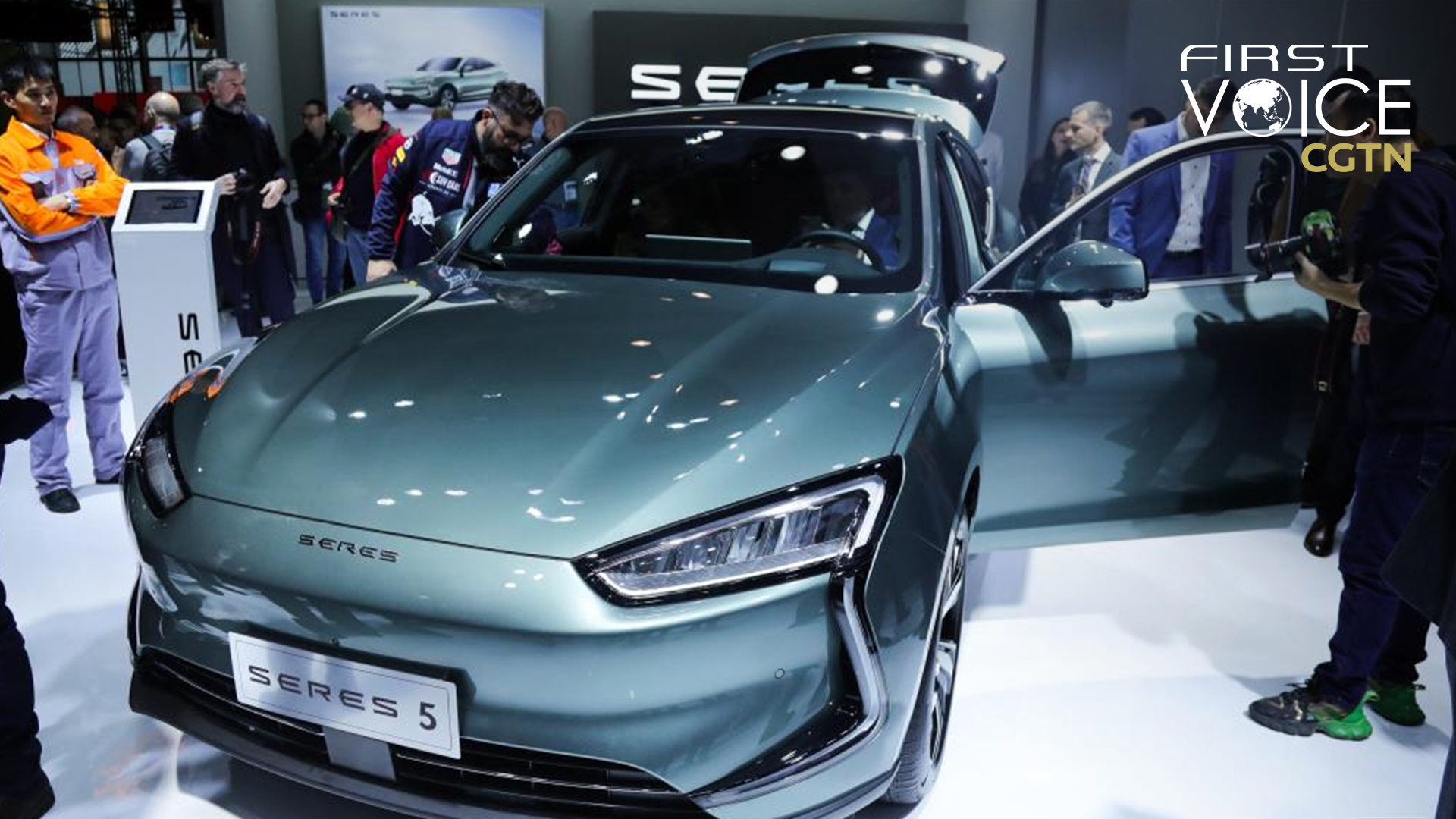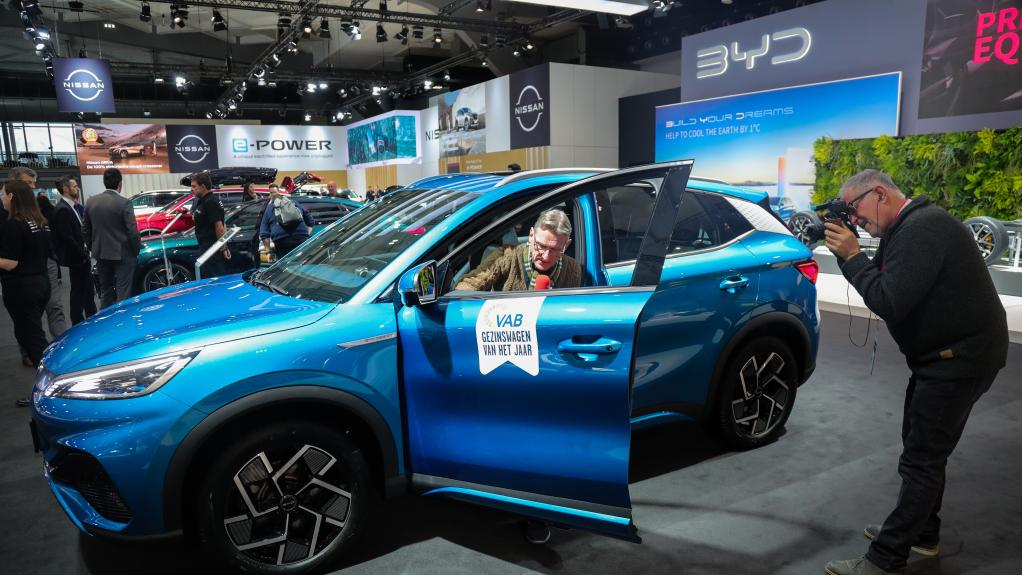
People experience a Seres 5 electric car during a media preview of the 100th Brussels Motor Show in Brussels, Belgium, January 13, 2023. /Xinhua
People experience a Seres 5 electric car during a media preview of the 100th Brussels Motor Show in Brussels, Belgium, January 13, 2023. /Xinhua
Editor's note: CGTN's First Voice provides instant commentary on breaking stories. The column clarifies emerging issues and better defines the news agenda, offering a Chinese perspective on the latest global events.
EU Commission President Ursula von der Leyen announced "an anti-subsidy probe" into Chinese electric vehicles (EV) on Wednesday. "Global markets are now flooded with cheaper electric cars. And their price is kept artificially low by huge state subsidies," Von der Leyen said in her annual address to the EU parliament.
The probe will seriously disrupt global supply chains and will jeopardize the long-term growth of the European automotive industry. To begin with, it is technological innovation – not so-called "excessive state subsidies" – that has built China's EVs into the leading force in the global market.
Take China's battery technology as an example. As a result of technological innovation, the Power Swap Station of Chinese EV brand NIO allows vehicles to switch to a fully-charged battery pack in just three minutes. One station can complete 312 swaps per day, according to Xinhua reports. In August, China's EV battery maker Contemporary Amperex Technology Co., Ltd. launched a new lithium iron phosphate battery capable of powering automobiles for 400 kilometers in only 10 minutes. Chinese carmakers, in recent years, have also accelerated the pace of automotive software research. China's BYD submitted 171 patent applications to Europe, 139 to the U.S., and 49 to Japan, according to Nikkei reports.
Apart from its technology advantage, competitive prices have made Chinese EVs popular in the European market. However, this cost advantage has nothing to do with so-called "state subsidies." Unlike European counterparts, most auto parts of Chinese EV brands are domestically made and assembled. After a detailed assessment of all parts pulled from BYD's Seal model, UBS found that 75 percent of components ranging from batteries to power semiconductors were made in-house. This, without doubt, has tremendously saved costs, giving China advantages in manufacturing, industrial clusters, also convenient and efficient infrastructure, etc. In addition, labor costs in China are still much cheaper than that in the EU.
As a result of their competitive prices and cutting-edge technology, the popularity of Chinese EVs is an undeniable fact. Statistics from auto consultancy Inovev show that 8 percent of new EVs sold in Europe this year were Chinese, up from 6 percent last year. The European market accounted for nearly half of China's total new-energy vehicle exports in 2022, according to the China Passenger Car Association.

Journalists make report on a BYD Atto 3 electric car during a media preview of the 100th Brussels Motor Show in Brussels, Belgium, January 13, 2023. /Xinhua
Journalists make report on a BYD Atto 3 electric car during a media preview of the 100th Brussels Motor Show in Brussels, Belgium, January 13, 2023. /Xinhua
Europe should view China's EV development in an objective way. However, by launching an "anti-subsidy" probe, the EU is arbitrarily using unilateral economic and trade tools to seize unfair advantages over Chinese rivals. The probe is, in essence, a practice of protectionism. The punitive tariffs, if imposed, would increase the operating costs of China-made EVs in the European market, putting the legitimate rights of Chinese firms in jeopardy.
Such a protectionist move, by creating hurdles for Chinese rivals, could gain European automakers some unfair advantages in the short run. But it will do no good to enhance Europe's auto competitiveness in the long term. To begin with, it will exert negative impacts on the economic ties between China and the EU. While European automakers have benefited a lot from the Chinese market and cooperation from their Chinese counterparts in the past years, crippled China-EU ties mean squeezed room for future collaboration and cooperation.
In addition, the stability of the global supply chain has repeatedly turned out to be vital for sound economic growth. Protectionist moves on Chinese EVs violate WTO rules, disrupt free trade, and create hurdles for the supply of certain parts to automakers. No European carmakers can benefit from the disrupted industrial chains in the long run. Besides, protectionism dampens European firms' will to improve.
Worse still, it is European customers who will pay for Von der Leyen's protectionist act. The EU should have learned a lesson from the trade war former U.S. President Donald Trump launched against China. According to a 2021 report by Moody's Investors Service, American importers absorbed over 90 percent of the additional costs caused by increased U.S. tariffs on Chinese goods. If the EU insists on its protectionist attempt on China, European customers will be the biggest victim. Would Europeans prefer EVs more expensive but with less-advanced technologies?
"Competition should spur us on, but not scare us," German Chancellor Olaf Scholz said earlier. In the face of competition, the EU can resort to innovation and cooperation for advantages over rivals. But protectionism is never the right way forward. China has always maintained an open attitude and welcomes European firms to expand their footprint in the Chinese market. But by introducing restrictive measures, is the EU scared by competitive foreign rivals?
(If you want to contribute and have specific expertise, please contact us at opinions@cgtn.com. Follow @thouse_opinions on Twitter to discover the latest commentaries in the CGTN Opinion Section.)